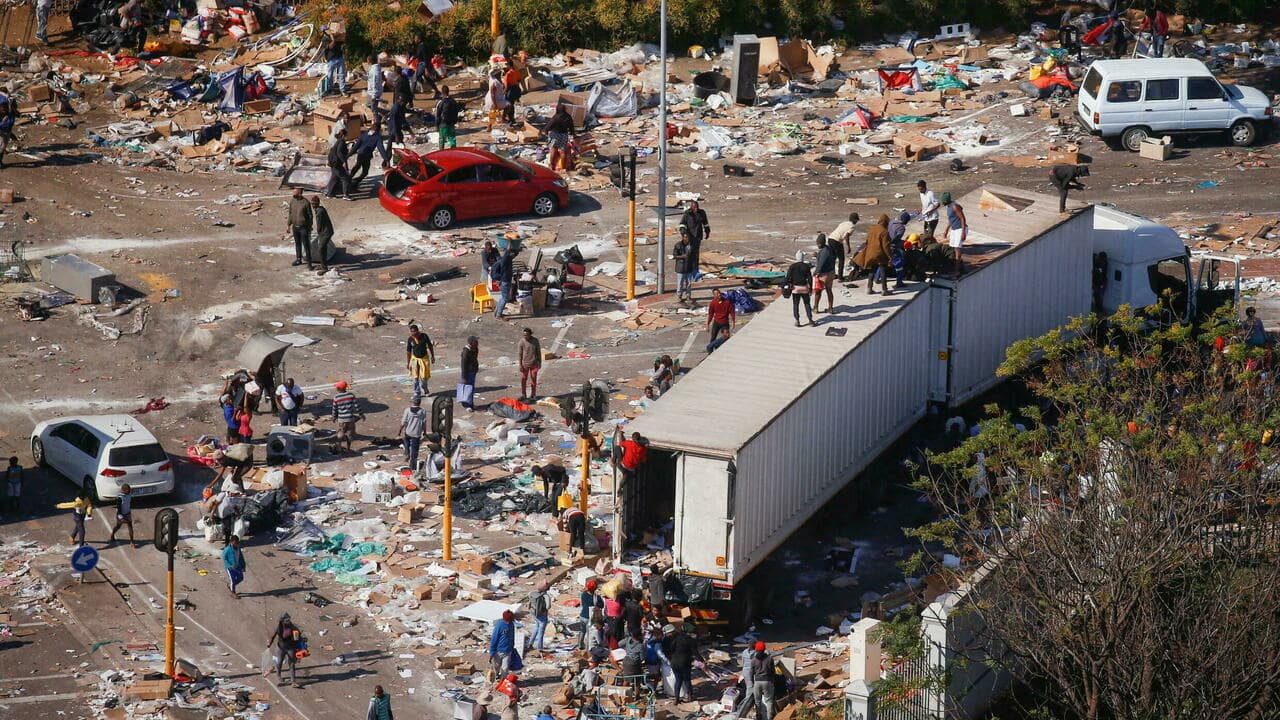In KZN, it was Christmas in July as thousands of thieves went on a looting frenzy, ultimately at the expense of taxpayers and insurance companies. Which is rather fitting since it quite accurately sums up the nine agonizing years former disgraced President Jacob Zuma was at the helm.
Like a biblical plague of locusts, criminals stripped bare everything in sight, from small retail outlets to larger businesses. In total 161 malls, 11 warehouses, 8 factories and 161 bottle stores were looted. And yet inside Exclusive Books the sound of crickets could be heard.
The thievery began in Zuma’s home province of KwaZulu Natal, soon spreading to Johannesburg and Pretoria. Police in the affected areas were completely outnumbered and proved as useful as knitted condoms. Chaos ensued for several days and with a fear of escalation in looting and reprisal action from innocent citizens tired of the mayhem, the government called in the army to quell the unrest. Consuming slightly less fried chicken than the men in blue, SANDF members cut a more intimidating image. And it was also a fair test for the army since, before the looting and civil unrest, the only other time they’ve been summoned was to abuse beachgoers and toddlers with their parents taking an afternoon stroll at the beginning of lockdown.
During the initial stages of the pillaging and protests, it was thought that disgruntled Zuma supporters and those fed up with a normal HD television took to the streets and malls. But it did not take long to realize that something slightly more wicked was in the process of unfolding.
This “spontaneous looting and civil unrest” was supposed to be the mise-en-scène for the Zuma and Ace Magashule pushback. Intelligence operatives and Zuma loyalists are behind the insurrection, which seemed to grain traction after social media posts encouraged widespread stealing and riots. Starting with ransacking, the next phase was to sabotage the country’s electricity infrastructure followed by the telecommunications sector, making it increasingly difficult to regain control of the tumult. With two crucial institutions taken care of, Ace and Zuma thugs could expose a weakness in the Ramaphosa leadership and possibly stage a coup if the opportunity presented itself. What those responsible for orchestrating the chaos did not anticipate was that their plot to bring the country to its knees would be uncovered.
While I am immensely relieved that eventually this nefarious plot was exposed, I do wonder how come it wasn’t assumed that something like this might occur not long after Zuma was jailed at Estcourt Correctional Center. I would not call it far-fetched to think that a man who has scant respect for the country he once led, would not resort to clever tactics to stay out of prison. Or to attempt to cause such widespread pandemonium that would result in his imminent release. Would anyone have called the Ramaphosa faction paranoid for taking preventative measures to ensure something like this never happened? What could Cyril and the good circle of the ANC have done to ensure this never materialized, or was the unrest inevitable meaning that only the concomitant action be critiqued?
After President Ramaphosa took over the ANC, the most sensible thing would have been to build a jail around Luthuli House and the Palace of Plunder, also known as Nkandla, before starting to rebuild the party. Since that wasn’t likely to happen, because the law doesn’t take that pragmatic a stance, Cyril would have to work with what he had. The task of cleaning up the ANC has been long and fraught with challenges. Such as winning over support of fence-sitters and gaining the trust of those who showed more support to Jacob Zuma at one point in time.
Zuma always had his own intelligence upon which he relied, and it served him well for many years. If the Ace and Zuma RET (Radical Economic Transformation) faction had their way, things could have been much different today. It is thought that some former members of the State Security Agency might have been behind the organized unrest. Though this has not been proven to be the case, I think this is a perfect example of why a government needs a competent and, most importantly, trustworthy intelligence agency. If Cyril Ramaphosa has any doubt about the current lot responsible for intelligence, now would be the time to establish a new SSA, totally independent of the old ANC. Of course, setting up something like this would cost billions, which isn’t exactly just lying around. But the ANC has been known to waste money like it has an expiry date. Such as affording ministers new cars every few months. Or by keeping Carl Niehaus on the payroll for aimlessly wandering the halls of Luthuli House doing, well, no one really knows what. Possibly the ANC felt too bad to get rid of Carl, much the way guilt prevents you tossing out a hideous old ornament.
With the violence and looting having come to an end, the province of KwaZulu Natal will take years to rebuild. Around thirty billion rand in damages and 115000 jobs have been placed at risk, which means the effects of the insurrection will be felt for a long time still. And the ones who are most impacted by it are the people who have the least. Which also happens to be those who were used as a tool in the political unrest.
The poor, known as voting fodder, have borne the brunt of the ANC’s shenanigans for a very long time, and the recent conflict was yet another example of this. Often, we hear those in power lament laboriously about a new dawn. An opportunity to start afresh once more; to make a difference. But as we have come to learn, the more things change, the more they stay the same.
